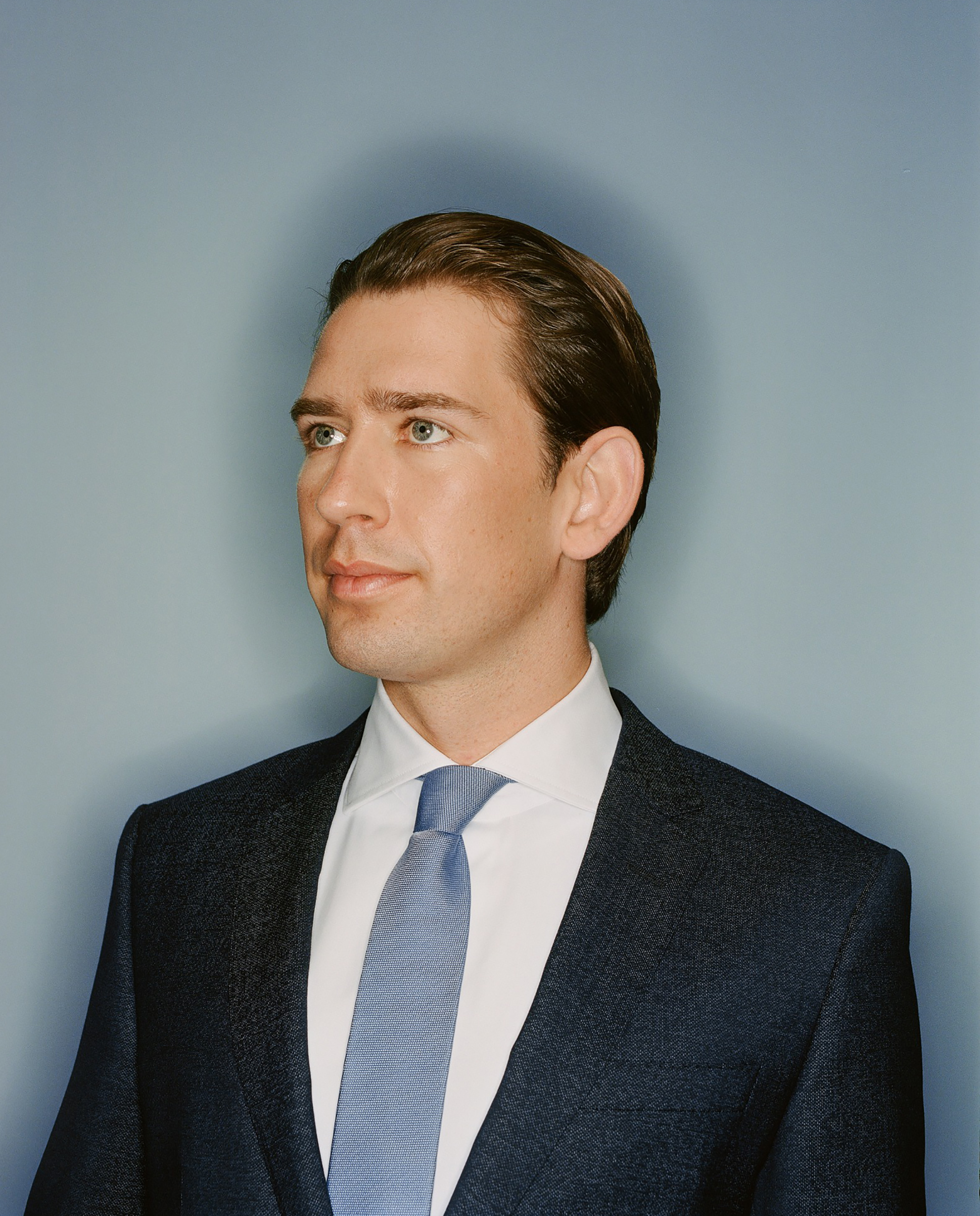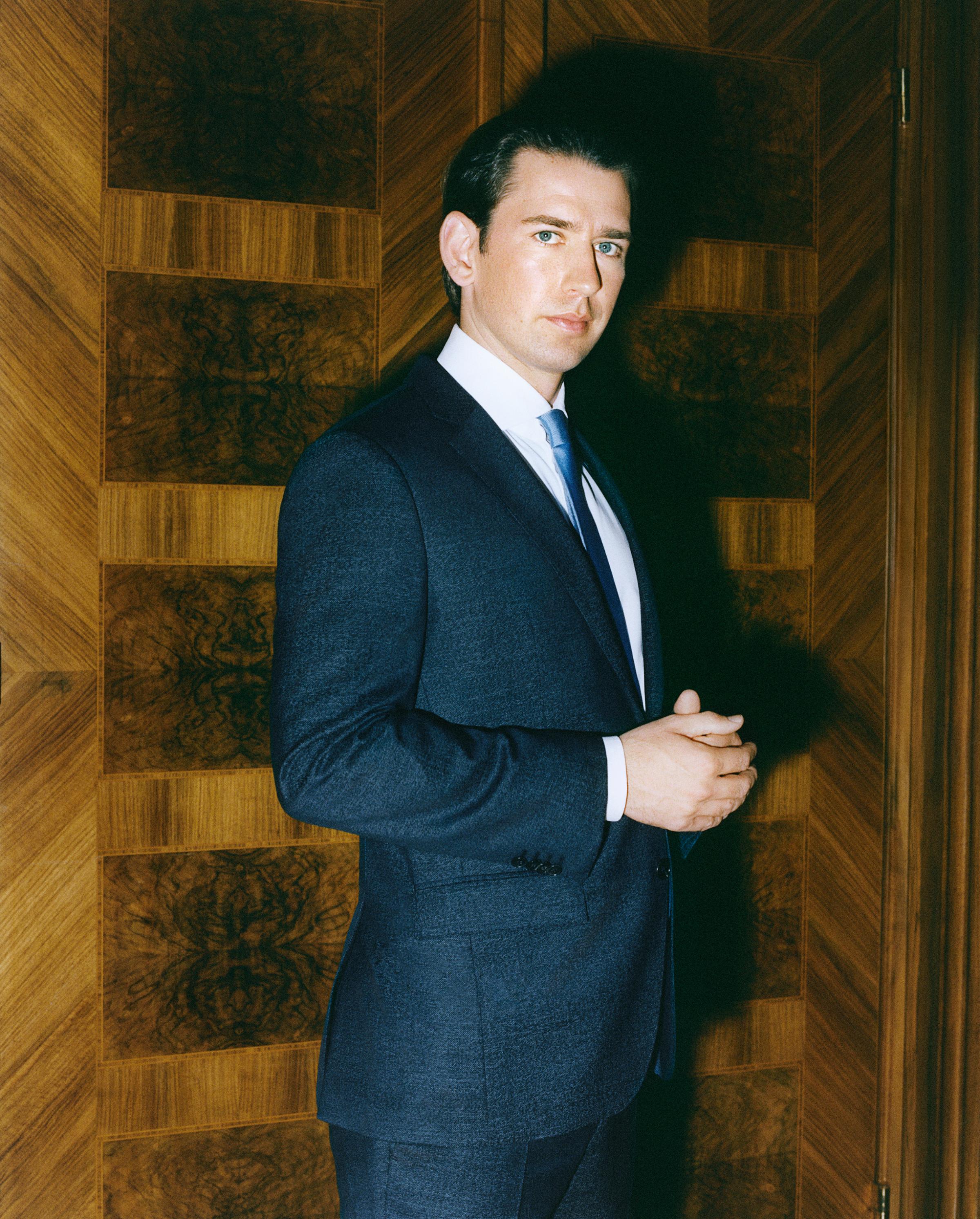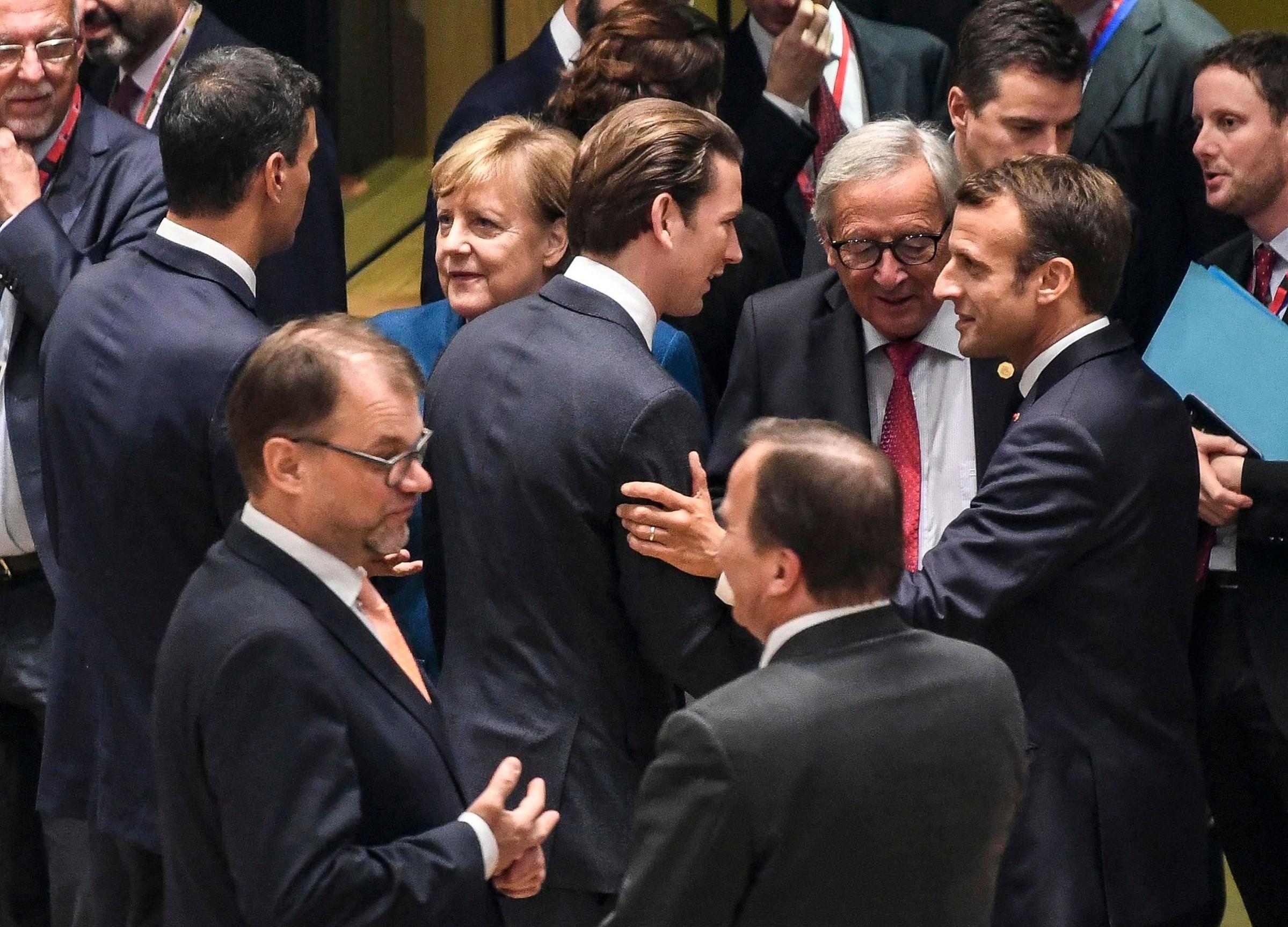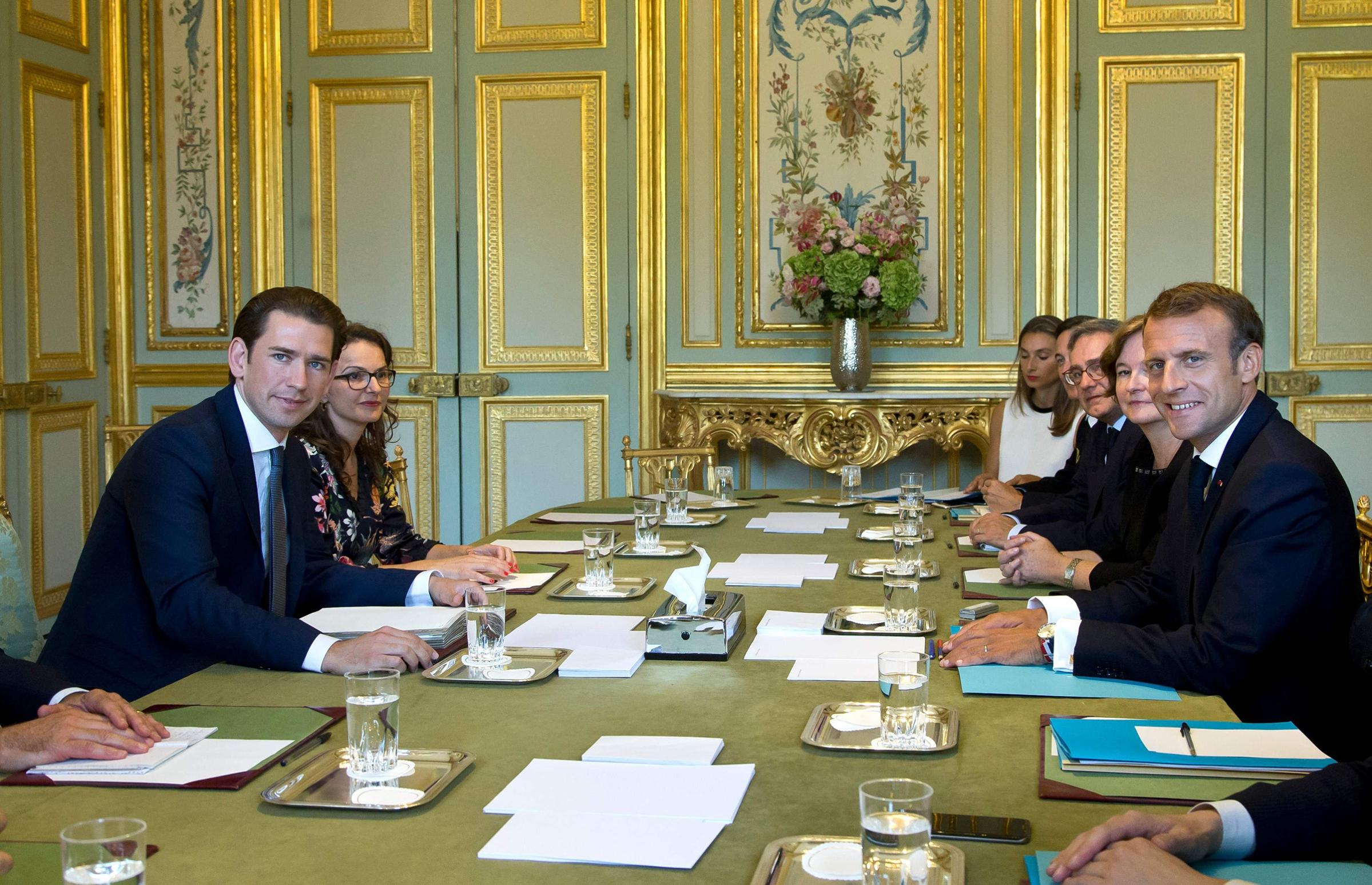
He made it all appear so easy. The fear, the hate, the insecurity in Europe started to seem like petty problems when Sebastian Kurz, the Chancellor of Austria, was on the stage in his hometown of Vienna, looking more like a class president in front of his high school reunion than a man who casts himself as Europe’s last best hope.
It was Oct. 13, almost exactly a year since Kurz had won the elections in Austria at the age of 31, becoming the youngest Chancellor in the country’s history, as well as the youngest democratic leader anywhere in the world. To mark the anniversary, he gathered a few hundred friends and fans in Vienna for a modest celebration. No music, no colored lights. Just the friendly new face of the European right, with a banner that read THE CHANGE HAS BEGUN.
The changes Kurz stands for were clear in his speech: harder borders and a tougher defense of Austria’s national identity. As he put it to his audience that day, “Those who do not put clear limits on migration will soon start to feel like strangers in their own land.” Such fears are changing Europe’s political landscape. And Kurz, who leads Austria as it holds the rotating presidency of the European Union, has emerged as a champion of transformation (or as others might argue, regression).
From France and Germany to Italy and Sweden, parties that had ruled from the center for decades have been weakened and pushed aside by populists and demagogues who speak the language of division: nationalism against globalism, the patriots against the traitors, the people against the Establishment. It’s the same language spoken by U.S. President Donald Trump, whose rise helped give these groups legitimacy and a sense of momentum.
For center-right conservatives like Kurz, the growth of the populist far right presented a dilemma: Should they co-opt the policies and tone of Trump and his fellow travelers, or risk being swept aside as stalwarts of the status quo? To put it more simply: Should they try to beat them or try to join them?
Kurz has made his choice. He formed a coalition government in 2017 with the populist and reactionary Freedom Party, bringing a movement that was founded by neo-Nazis back into a position of power. In Austria, the far right and the mainstream have merged during his tenure on the issues that trouble Europe the most, namely identity, Islam and immigration. The young Chancellor calls the union a democratic necessity. His critics say he has sanitized some of the most odious figures on the European right, and branded him the “Alpine Trump.”
Inside the Trump Administration, some have taken notice. The U.S. President’s ambassador to Germany, Richard Grenell, referred to Kurz as a “rock star” during an interview this summer with Breitbart News, adding, “I’m a big fan.” As Trump’s most loyal envoy in Europe, Grenell has pledged to “empower” European conservatives, holding the Austrian Chancellor up as an example.
But when TIME met him earlier this fall at his office in Vienna, Kurz couldn’t have seemed further from the Trumpian stereotype. He arrived a mere two minutes late but, with a hand on his heart, apologized twice for the delay. He then poured me some sparkling water and wiped the glass clean with his palm. When we were finished talking, he offered to help carry the photographer’s equipment to the car. That is his style, one of his advisers noted afterward. He is cordial. He is modest. He listens. Another adviser assured me that Kurz prefers to take commercial flights, usually in coach.
And unlike key figures on the far right in Europe like Italy’s Matteo Salvini or France’s Marine Le Pen, Kurz disdains comparisons to his U.S. counterpart. When I pointed out that Kurz’s drink of choice–a Diet Coke–is also that of Trump, he paused and said with a smile, “Maybe I should make a change.”
To many in Austria–and in Europe–it’s too late for that. Florian Klenk, an influential Austrian newspaper editor, tells TIME the Chancellor’s pact with Austria’s far right has already opened the gates to barbarians. “Kurz likes to call himself a bridge builder. But a bridge to what?” he asks over a plate of schnitzel in a Viennese café. “Do we need a bridge to neofascists? I’m not so sure.”

Kurz has presented himself as a changemaker. But on paper at least, he looks like a traditional conservative. Born into Vienna’s middle class, with a summer home in the countryside, he was still a teenager when he went to work at the conservative People’s Party, one of the stodgier mainstays of Europe’s establishment. His rise through the ranks of that party was so straightforward that his biographer, Paul Ronzheimer, took less than a month to write his life story. “It wasn’t very complicated,” he told me.
Appointed minister in charge of integrating migrants at the age of just 24, he soon built a reputation for toughness, verging on meanness, when it came to migrants from the Muslim world. Among his most famous initiatives was a call for imams to deliver their sermons in German. With legal amendments aimed at the Muslim community in Austria, his government banned foreign funding of Islamic organizations and shut down mosques linked to “political Islam.”
These positions were so far to the right of center at the time that some leaders of his own party did not want to be photographed next to Kurz. But in 2015, when migrants and refugees from the Middle East surged into Europe, his hard-line views on immigration began to seem ahead of their time. Over the protests of the E.U. and the U.N., Kurz–by then Foreign Minister–reached a deal with Austria’s neighbors in the Balkans to close the E.U.’s eastern borders to migrants and refugees. The move outraged German Chancellor Angela Merkel, who was then working on a separate deal with Turkey to stem the tide of refugees.
The plan worked, reducing the flood of arrivals to a relative trickle. But it was a disaster for E.U. solidarity. By closing the border between Greece and Macedonia, Kurz’s plan left tens of thousands of migrants stranded in a squalid camp near the Greek village of Idomeni. The Prime Minister of Greece said his country was at risk of becoming “a warehouse of souls” unless his fellow E.U. leaders came to help. “When kids are born and old people die in the mud of Idomeni, that’s the political work of Sebastian Kurz,” said Michel Reimon, a member of the European Parliament from Austria’s left-wing Green Party.
But in Austria’s conservative countryside, the closing of the borders in the winter of 2016 made Kurz a national hero. “The closing of the Balkan route made Kurz a political star in Austria,” Ronzheimer writes in his biography. “He enjoyed that role.” He became the People’s Party chairman in May 2017, and five months later the party finished first in legislative elections–allowing him at just 31 to become the youngest Chancellor in Austria’s history. Yet despite his anti-immigration policies, progressives have not treated Kurz as a pariah–in July, Austria assumed the presidency of the European Union’s council as planned, putting Kurz at the heart of liberal Europe. It seems the leadership in Brussels has broadly accepted Kurz as the lesser of competing evils.
That’s likely because the alternative in Austria would be Kurz’s coalition partner, the Freedom Party, which was founded by actual, unrepentant Nazis in the aftermath of World War II. As recently as the 1990s, its leader had defended veterans of the Nazi SS as “men of character” and praised Adolf Hitler for his “orderly” labor policies. (Hitler’s regime used slave labor on an industrial scale.) Over the past year, the Freedom Party of Austria has been among the more extreme groups–and the most popular–to fill the seats of any parliament in Europe. Its presidential candidate, Norbert Hofer, narrowly lost the elections in 2016 with 46% of the vote. “He was like David against the Goliath of the system,” says his political mentor, Heinz-Christian Strache, who has led the Freedom Party for over a decade.
Europe’s liberals did express discomfort when Kurz forged a partnership with the Freedom Party in 2017. But they have rarely condemned him for it in public. Instead they have observed Kurz’s experiment in managing the radical right. He has let the Freedom Party govern alongside him, giving it the right to appoint the heads of six of Austria’s 10 ministries, including those in charge of the police, the military, the intelligence services and the diplomatic corps.
One of the key concessions Kurz got in return was a promise from the Freedom Party not to call for Austria to leave the European Union–at least not in the next five years. This may explain why the E.U. reaction has been so much more muted than it was in 2000, when the Freedom Party was last allowed to govern under Jörg Haider, the son of Austrian Nazis who defended the Third Reich.

Back then the E.U. imposed sanctions against Austria in response. Israel withdrew its ambassador from Vienna that year, while the U.S. refused to talk to any Freedom Party members. Hundreds of thousands of protesters brought Austria’s capital to a standstill for weeks that winter, forcing the then Chancellor to use underground tunnels to get to work. None of that happened this time around. “The Freedom Party has not changed. But the landscape has changed,” says Joschka Fischer, who pushed for the E.U. to sanction Austria in 2000, when he was serving as Germany’s Foreign Minister. “The far right is now on the rise in many, many places in Europe. That’s just a fact.”
The most pointed rebuke Kurz received in response, at least in public, may have been the recent one from Jean-Claude Juncker, one of the E.U.’s most senior officials, who visited Vienna on Oct. 4 to mark the centenary of the Austrian Republic. “When stupid populism and narrow-minded nationalism march toward the future,” Juncker said, “one must get up and stop it while there is still time.” It was a big applause line for the liberals in the audience. The Chancellor, seated in the front row, clapped along politely.
He knows isolating the far right has not proven to be a winning strategy elsewhere in Europe. As the far-right National Front came within reach of winning the French presidency last year, all of the country’s political leaders pledged never to let it govern. Among them was Emmanuel Macron, who ended up winning the presidency in a landslide. But the National Front has recovered from that loss as it has in the past: by assailing the government’s policies. One survey published in September had Macron’s party neck and neck once again with the xenophobic National Front.
For Kurz, freezing out the Freedom Party was not an option. It was just too popular. “It was No. 1 in all the polls last year,” the Chancellor says. “Everybody said they are going to win.” But Kurz came from behind and, after the left-wing social democrats refused to govern with him in coalition, he felt it would be undemocratic to block out the Freedom Party, which had won more than a quarter of the popular vote. “Whether you like it or not, it’s the people who decide,” says Kurz.
That logic seems sound, but it comes with a peculiar caveat in Austria, the homeland of Hitler, who also came to power through the ballot box. His Nazi Party won 37% of the vote in Germany in 1932, making it the largest party in the German parliament and paving the way for Hitler to rule by decree. Six years later, when Hitler’s forces annexed Austria, they were received by cheering crowds of locals. Doesn’t that history make Kurz wonder about the people’s infallibility? It was the only question that made his mood go dark during our interview. “We should be careful with such comparisons,” he says after a pause. “What we had back then was not a functioning democracy.” In other words, it won’t happen again.
But the neo-Nazi roots of the Freedom Party are still impossible to ignore for many of Austria’s foreign allies. Chief among them is Israel, which refused to have any contacts with Strache even after he became the Vice Chancellor of Austria in Kurz’s government at the end of last year. Israeli leaders have not forgotten that the Freedom Party’s Haider “was an iconic figure in terms of anti-Semitism” during the 1990s, says Ehud Olmert, the former Prime Minister of Israel.
That history still haunts the party today. Weeks after Kurz formed his coalition government, a Nazi songbook was found in the former fraternity of a prominent figure in the Freedom Party. One song in the book made sickening light of the fact that 6 million Jews had been killed in the Holocaust, many of them in Nazi gas chambers. “Turn up the gas,” says a line in the song. “We’ll make it to 7 million.”
Kurz, who usually avoids criticizing his coalition partners in public, did speak up about that scandal. He condemned the Nazi song and called for an investigation of the fraternity, which the government said would be dissolved. “I took a very clear position,” Kurz says. But the affair did not stop the Chancellor from cementing his partnership with Strache.
To his relief, Israel agreed not to withdraw its ambassador from Vienna in response. Olmert, the former Prime Minister, says that was not an easy call. “We had to ask ourselves, ‘Is it better to boycott Austria? Or is it more advantageous to take the Austrian Chancellor and to try and teach him?'” he tells TIME, noting with a smile that Kurz is younger than his youngest son. “If we can influence him, that I think is worth the effort.”

The idea that Kurz might be malleable rests on a dubious assumption: that he will be able to moderate his partners on the right, or at least control their darker instincts. His allies told me that was never his intention. “You don’t enter into a coalition in order to change your partners,” says Wolfgang Sobotka, the speaker of Austria’s parliament and a leading figure in Kurz’s party. “We are not pedagogues,” he says.
Besides, the constant infighting among Austria’s ruling parties is what drove so many voters to side with the far right in the first place, says Kurz. That’s why he does his best to avoid public clashes with the Freedom Party. Across Europe, he says, far-right parties are getting stronger. “And I think the best answer is not to focus on these parties or to criticize the voters who vote for them. What we need are politicians in the center who do a good job.”
Since taking power, the Chancellor has given the Freedom Party plenty of room to govern. With sweeping influence over law enforcement and the armed services, the party has sought to put its loyalists in key positions throughout the bureaucracy, or as one regional Freedom Party official put it in a speech this summer, “to steal a march through the institutions.” Asked whether Kurz had done anything to rein in the Freedom Party, its co–general secretary, Christian Hafenecker, told me, “No one can control the Freedom Party.” Its leaders have focused on their defining issue–tightening border security with a beefed-up police force and lots of fiery rhetoric against the threat from refugees–while leaving Kurz to focus on tough reforms of the labor code and the economy.
The Chancellor has, however, eroded the Freedom Party’s base of support. His approval ratings have been climbing in the months since he took power, while the Freedom Party has been dropping in the polls. If that trend continues, some of his advisers worry that the far right could begin to lash out at the Chancellor in an effort to weaken him and seize more power.
For now, though, Kurz seems intent on keeping his bridge to the far right intact. He says that approach is grounded in history. In the speech he gave on Oct. 13 to mark the anniversary of his election victory, he tried to answer one of the hardest questions of Austria’s past: Why was the country so quick to embrace fascism in the 1930s and to help the Nazis wage their genocidal war?
The reason, Kurz said, was polarization, the endless quarrels between the right wing and the left. “The opposing sides fought each other with more and more ferocity,” he said, until their democracy “slipped into chaos.” The way to avoid that, he said, is through an orderly political dialogue with all sides. Given the alternative, his liberal peers in Europe have little choice but to bite their tongues and hope that Kurz succeeds.
More Must-Reads from TIME
- Donald Trump Is TIME's 2024 Person of the Year
- Why We Chose Trump as Person of the Year
- Is Intermittent Fasting Good or Bad for You?
- The 100 Must-Read Books of 2024
- The 20 Best Christmas TV Episodes
- Column: If Optimism Feels Ridiculous Now, Try Hope
- The Future of Climate Action Is Trade Policy
- Merle Bombardieri Is Helping People Make the Baby Decision
Contact us at letters@time.com